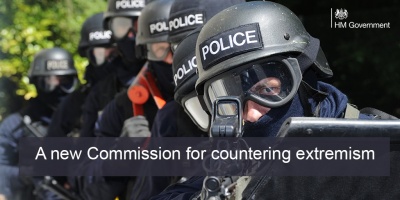Commission for Countering Extremism

The Commission for Countering Extremism is a legal body set up by the British Conservative government in 2018 'to stamp out extremist ideology in all its forms'.
It is tasked with identifying and challenging extremism, advising ministers on new policies and promoting 'pluralistic British values'.
Controversy over choice of new extremism tsar
In January 2018 home secretary Amber Rudd announced she had appointed women's rights campaigner Sara Khan of Inspire to lead the commission, prompting strong criticism from politicians such as Baroness Warsi and Labour MP Naz Shah as well as Muslim groups. [2]
Critics
Politicians
Former Tory chairwoman Sayeeda Warsi called it 'a deeply disturbing appointment', tweeting:
- Sara has unfortunately been a strong advocate of the government’s policy of disengagement, a policy which many, including members of the police and intelligence services, consider has damaged the important battle to engage Britain’s Muslim communities. For the commissioner to be effective the person had to be an independent thinker, both connected to and respected by a cross-section of British Muslims. Sara is sadly seen by many as simply a creation of and mouthpiece for the Home Office.”[3]
Muslim groups and individuals
A letter petition to the Home Office signed by 100 Muslim organisations and scholars the following day called for Khan to be immediately removed from her new role. It was, said the letter a "deeply flawed and inappropriate" appointment. [4] It stated that Khan has 'no grassroots credibility within the Muslim community' and lacked the necessary academic background and serious practical experience for the role. Khan, said the letter, also 'has lacked transparency over the years with 'conflict of interests' arising between her organisation, Inspire, and public bodies.' Petition signatories included the grassroots organisation MEND, which was criticised previously by Khan, and the Muslim Council of Britain. [5]
Founders of the Muslim Women’s Collective, Bushra Wasty and Sulekha Hassan, argued in the Guardian that 'the choice [of Khan] calls to question the government’s overall approach. Is it one that encompasses the far right, which has increasingly inspired violent attacks? Or does it intend to heavy-handedly single out Muslims, which would reinforce the feeling of a community under constant scrutiny?' Like Baroness Warsi, Wasty and Hassan emphasised how Khan's longstanding support for and links to the government's Prevent strategy was a key issue which 'has made it especially important that she builds bridges with other Muslims'. [6]
Writer Siema Iqbal argued that Khan's overt support for the UK's Prevent policy should disqualify her from leading the new commission. She wrote: 'As a woman I would normally celebrate the success of another woman, regardless of faith or colour. However, this time I do not. This time I am offended. I am offended that a Muslim woman has been used to send the message that the government's controversial counter-terrorism policy, Prevent, will remain, because by choosing someone so in favour of it with hardly any links to the community it becomes clear where the weight of this commission will lie. [7]
Supporters of Khan's appointment
- David Anderson QC, the former independent reviewer of terrorism legislation, cautiously welcomed Khan's appointment on Twitter, saying: 'I for one will be giving Sara a fair chance, and wishing her the good luck that I suspect she will need! 'The idea that she is a Government stooge is hard to reconcile with her opposition (strongly shared by me) to its ill-advised 2015/16 plans for a Counter-Extremism Bill.' Anderson, however, has expressed his reservations over the UK government's strategy, as any attempt to create criminal laws on "extremism" would lead it into a potential legal minefield given how difficult extremism is 'to difficult to legally define'. [8]
- Dame Louise Casey, former government official Director who was appointed Director General, Casey Review Team on 20 July 2015 to lead a review into 'opportunity and integration in some of our most isolated communities'. [9]
Think tanks
Others
Sunny Hundal (journalist) | Zac Goldsmith (ex-London mayoral candidate) | Amina Lone |Melanie Phillips (columist at The Times [10]
Khan's response
In a Guardian op-ed entitled 'as anti-extremism chief, I hear my critics – but I’ll listen to victims too' Khan argued that 'doing nothing is no longer an option'. Her first task 'will be to carry out a comprehensive study of the scale, influence and reach of extremism in Britain'. [11]
External resources
- Bushra Wasty and Sulekha Hassan, Why we’re concerned about Sara Khan, the new anti-extremism chief, Comment is Free, guardian.co.uk 25 January 2018
- Tahir Abbas, Sara Khan is not the issue, it is how the state treats radicalisation, Middle East Eye, 25 January 2018
Contact
- Address:
- Website:
Resources
Notes
- ↑ Alan Travis, Home Office evokes Orwellian vision of anti-extremism commission, 21 June 2017
- ↑ Jamie Grierson, Choice of new UK anti-extremism chief criticised as 'alarming', Guardian, 25 January 2018, accessed same day
- ↑ Jamie Grierson, Choice of new UK anti-extremism chief criticised as 'alarming', Guardian, 25 January 2018, accessed same day
- ↑ New counter-extremism tsar Sara Khan facing calls to quit, Sky News, 25 January 2018, accessed 31 January 2018
- ↑ 100 Muslim organisations call on UK government to fire Sara Khan, Middle East Eye, 25 January 2018
- ↑ Bushra Wasty and Sulekha Hassan, Why we’re concerned about Sara Khan, the new anti-extremism chief, Comment is Free, guardian.co.uk 25 January 2018
- ↑ I am insulted at Sara Khan's appointment, Middle East Eye, 28 January 2018, accessed 1 February 2018
- ↑ Extremism 'difficult to legally define', says ex-UK terrorism watchdog, Middle East Eye, 31 January 2018, accessed 1 February 2018
- ↑ Dame Louise Casey, gov.uk, accessed 1 February 2018
- ↑ Melanie Phillips, Cowardice allows Muslim extremism to thrive, The Times, 29 January 2018
- ↑ Sara Khan, As anti-extremism chief, I hear my critics – but I’ll listen to victims too, guardian.co.uk 26 January 2018, accessed 31 January 2018